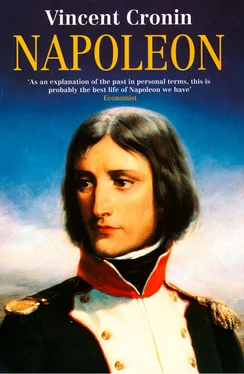Vincent Cronin - Napoleon
Здесь есть возможность читать онлайн «Vincent Cronin - Napoleon» — ознакомительный отрывок электронной книги совершенно бесплатно, а после прочтения отрывка купить полную версию. В некоторых случаях можно слушать аудио, скачать через торрент в формате fb2 и присутствует краткое содержание. Жанр: unrecognised, на английском языке. Описание произведения, (предисловие) а так же отзывы посетителей доступны на портале библиотеки ЛибКат.
- Название:Napoleon
- Автор:
- Жанр:
- Год:неизвестен
- ISBN:нет данных
- Рейтинг книги:3 / 5. Голосов: 1
-
Избранное:Добавить в избранное
- Отзывы:
-
Ваша оценка:
- 60
- 1
- 2
- 3
- 4
- 5
Napoleon: краткое содержание, описание и аннотация
Предлагаем к чтению аннотацию, описание, краткое содержание или предисловие (зависит от того, что написал сам автор книги «Napoleon»). Если вы не нашли необходимую информацию о книге — напишите в комментариях, мы постараемся отыскать её.
Napoleon — читать онлайн ознакомительный отрывок
Ниже представлен текст книги, разбитый по страницам. Система сохранения места последней прочитанной страницы, позволяет с удобством читать онлайн бесплатно книгу «Napoleon», без необходимости каждый раз заново искать на чём Вы остановились. Поставьте закладку, и сможете в любой момент перейти на страницу, на которой закончили чтение.
Интервал:
Закладка:
NAPOLEON
Vincent Cronin

Dedication
FOR
CHANTAL
Contents
COVER
TITLE PAGE
DEDICATION
PREFACE
1. A Happy Childhood
2. Military Academies
3. The Young Reformer
4. Failure in Corsica
5. Saving the Revolution
6. In Love
7. Josephine
8. The Italian Campaign
9. Fruits of Victory
10. Beyond the Pyramids
11. A New Constitution
12. The First Consul
13. Rebuilding France
14. Opening the Churches
15. Peace or War?
16. Emperor of the French
17. Napoleon’s Empire
18. Friends and Enemies
19. The Empire Style
20. The Road to Moscow
21. Retreat
22. Collapse
23. Abdication
24. Sovereign of Elba
25. A Hundred and Thirty-Six Days
26. The Last Battle
27. The End
APPENDIX A: Memoir-Writers and Napoleon
APPENDIX B: ‘ Clisson et Eugénie ’
SOURCES AND NOTES
INDEX
KEEP READING
ABOUT THE AUTHOR
ALSO BY THE AUTHOR
COPYRIGHT
ABOUT THE PUBLISHER
Preface
WHEN Napoleon first set foot on the deck of an English warship, he watched the sailors heaving the anchor up and setting the sails, and he remarked how much quieter the ship was than a French ship. Six times quieter, he reckoned. The book that follows is quieter than most books about Napoleon in the sense that there is less gunfire. It is a biography of Napoleon, not a history of the Napoleonic period, and biography, I believe, should deal with events that throw light on character. Not all Napoleon’s battles do that, and Napoleon himself declared that on the battlefield he counted for no more than half: ‘It is the army that wins the battle.’
But why a new biography at all? For two reasons. First, since 1951 new material has come to light of great importance, not in the sense that it adds fresh details here and there, but because it obliges us to take a fundamentally new look at Napoleon the man. This material is: the Notebooks of Alexandre des Mazis, Napoleon’s closest friend in his youth, Napoleon’s letters to Désirée Clary, the first woman in his life, the Memoirs of Louis Marchand, Napoleon’s valet, and General Bertrand’s Boswellian St Helena diary. None of this, save the last part of Bertrand, has been published in England. Also important is the long-missing central section of Napoleon’s autobiographical story, ‘ Clisson et Eugénie ’, into which a frustrated young officer of twenty-five poured his aspirations, and which is here published for the first time.
The second reason is more personal. There are in existence a large number of Lives of Napoleon and, though it will sound presumptuous, I was dissatisfied with their picture of Napoleon. I could not find a living, breathing man. Always to my mind there were glaring contradictions of character. To take one example from many, biographers repeat Napoleon’s phrase: ‘Friendship is only a word. I love no man.’ But at the same time it was obvious from their own pages that Napoleon had many close friends, more I reckon than any ruler of France, and that he was as fond of them as they were of him. Many of the biographers were evidently embarrassed by this seeming contradiction, and they tried to explain it by saying that Napoleon was different from other men: ‘Napoleon was a monster of egoism,’ or ‘Napoleon was a monster of insincerity.’
I for one do not believe in monsters. I wanted, as I say, to find a Napoleon I could picture as a living, breathing man. I knew of course that widely divergent opinions were only to be expected about Napoleon’s public life, but about the facts of his personal life there was no reason to expect divergency. So I began to look at the sources. I found that a surprising number of the sources generally used were, to say the least, of dubious value. Napoleon’s phrase, ‘Friendship is only a word’, occurs only in the Memoirs of Bourrienne, Napoleon’s former secretary. Now Bourrienne embezzled half a million francs from Napoleon, had to be posted abroad, where he embezzled a further 2 million, and finally had to be dismissed the service. After Napoleon’s fall he rallied to the Bourbons, but again had to be dismissed for dishonesty. In order to help pay his debts he decided to publish his Memoirs. Bourrienne did not write them, though; he only supplied notes for part of them, and these were then ‘ghosted’ by a journalist favourable to the Bourbons. Shortly after publication Bourrienne had to be shut up in a lunatic asylum. Immediately after his Memoirs appeared a group of men in a position to know published a book of 720 pages entirely devoted to correcting Bourrienne’s errors of fact. That admittedly is an extreme example but there are eight other Memoirs which no jury in an English court of law would accept as fair evidence; yet these have been drawn on again and again by biographers.
As I continued my critical evaluation of sources – which appears as Appendix A – I was able to clear up many of the contradictions that had puzzled me. But in the process I found that I had to modify my previous opinion of Napoleon. Different qualities, different defects began to emerge, and it was then that I decided to try to write a new Life of Napoleon, one of the first to be based on a critical evaluation of sources, which would also combine the new material I have spoken about earlier. It would be more concerned with civil than with military matters, because Napoleon himself gave more time to civil matters. Even as a second lieutenant Napoleon cared more about social improvements at home than conquests abroad, and though circumstances caused him to fight during most of his reign, he always insisted that he was primarily a statesman. In describing Napoleon’s constructive work, and even his thwarted intentions, I have drawn wherever possible on the diaries or Memoirs of the men who knew him best: such as Desaix in Italy, Roerderer during the Consulate, Caulaincourt during the last years of Empire.
Napoleon once dreamed he was being devoured by a bear. That, and two other dreams – one about drowning, the other about Josephine – are all we know about his dream life. But Napoleon was, among other things, a bookworm. During his leisure moments, whether at Malmaison or on campaign, he could usually be found deep in a book, and we know exactly which books and plays moved him. These I discuss in some detail, believing that, like dreams, they throw light on his longings and fears.
I have used the following manuscripts in public collections: in the Bibliothèque Thiers the rich collection formed by Frédéric Masson, including the journal of Dr James Verling, who lived in Longwood from July, 1818 to September, 1819, and the unexpurgated copy of Gourgaud’s diary: both provide valuable details about Napoleon’s health and morale; in the Institut de France, the Cuvier papers, which show how Napoleon organized education; in the Public Record Office, Lowe’s dispatches to Lord Bathurst and the Foreign Office papers relating to Switzerland, which clarify the rupture of the Treaty of Amiens; in the British Museum, two short Napoleon autographs; the Windham Papers, which show how closely the English ruling class was involved with French émigrés; the Liverpool Papers, particularly Add. MS. 38,569, the volume of cipher letters from Drake, in Munich, to Hawkesbury, keeping him abreast of the plot to overthrow Napoleon; and the diary and reports of Captain Nicholls in St Helena.
A word about spelling. I have followed English usage in omitting the accents from Napoleon, Josephine and Jerome, and the hyphen from double Christian names, such as Marie Louise. For places in France I have used French spelling; for places elsewhere I have adopted English versions.
Читать дальшеИнтервал:
Закладка:
Похожие книги на «Napoleon»
Представляем Вашему вниманию похожие книги на «Napoleon» списком для выбора. Мы отобрали схожую по названию и смыслу литературу в надежде предоставить читателям больше вариантов отыскать новые, интересные, ещё непрочитанные произведения.
Обсуждение, отзывы о книге «Napoleon» и просто собственные мнения читателей. Оставьте ваши комментарии, напишите, что Вы думаете о произведении, его смысле или главных героях. Укажите что конкретно понравилось, а что нет, и почему Вы так считаете.












